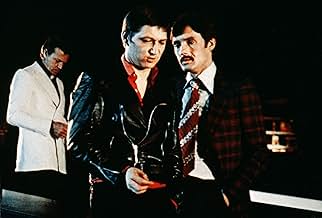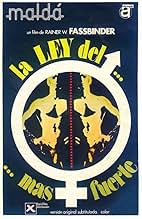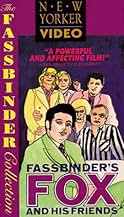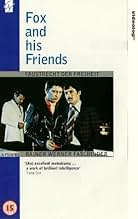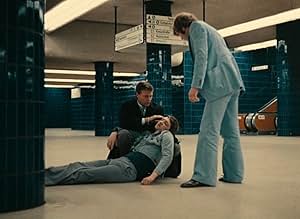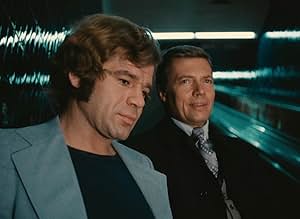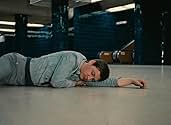IMDb-BEWERTUNG
7,6/10
7335
IHRE BEWERTUNG
Ein junger westdeutscher Arbeiter gewinnt in der Lotterie und beginnt eine Beziehung zu einem Mann über seiner gesellschaftlichen Stellung.Ein junger westdeutscher Arbeiter gewinnt in der Lotterie und beginnt eine Beziehung zu einem Mann über seiner gesellschaftlichen Stellung.Ein junger westdeutscher Arbeiter gewinnt in der Lotterie und beginnt eine Beziehung zu einem Mann über seiner gesellschaftlichen Stellung.
- Regie
- Drehbuch
- Hauptbesetzung
- Auszeichnungen
- 1 wins total
Karlheinz Böhm
- Max
- (as Karl-Heinz Böhm)
Harry Baer
- Philip
- (as Harry Bär)
Karl-Heinz Staudenmeyer
- Krapp
- (as Karl Heinz Staudenmeier)
Marquard Bohm
- American Soldier
- (as Marquart Bohm)
Empfohlene Bewertungen
A powerful and harrowing melodrama and one of Fassbinder's most accessible movies,this is a must-see for all those interested in intelligent filmmaking.The tragic story of Fox is masterfully and poignantly handled by Fassbinder, while never slipping into sloppy sentimentality.At the same time the film explores sexual and political issues that are still very much relevant.
10Itchload
Fassbinder is an acquired taste in every sense of the word. It took me awhile to be able to fully digest and appreciate his films, and even then it can be difficult.
Fox and His Friends is one of his "accessible" movies, but Fassbinder at his most accessible would probably highly alienate most movie goers.
I've seen this movie 3 times. The first time I thought "that was a good Fassbinder". The second time, I thought the same. The third time, I realized it was brilliant. It might be because I recently bought the amazing dvd, which has an excellent transfer. Fassbinder made his films quickly, very quickly, so a faded old videotape sometimes seems to reflect that. However, when seeing the crisp DVD I realized just how great the camera work was and how well-planned out the movie was.
This would make a good starting point for entering the world of Fassbinder I would think, it has it all: well-framed shots, black humor, and an extremely depressing ending. Depending on how much you can relate to this sort of thing, I would recommend checking it out.
p.s. The last scene was later homaged in My Own Private Idaho (another great movie) and Fassbinder gives a really good performance in the lead.
Fox and His Friends is one of his "accessible" movies, but Fassbinder at his most accessible would probably highly alienate most movie goers.
I've seen this movie 3 times. The first time I thought "that was a good Fassbinder". The second time, I thought the same. The third time, I realized it was brilliant. It might be because I recently bought the amazing dvd, which has an excellent transfer. Fassbinder made his films quickly, very quickly, so a faded old videotape sometimes seems to reflect that. However, when seeing the crisp DVD I realized just how great the camera work was and how well-planned out the movie was.
This would make a good starting point for entering the world of Fassbinder I would think, it has it all: well-framed shots, black humor, and an extremely depressing ending. Depending on how much you can relate to this sort of thing, I would recommend checking it out.
p.s. The last scene was later homaged in My Own Private Idaho (another great movie) and Fassbinder gives a really good performance in the lead.
The ironically titled Fox and His Friends, Fassbinder's rather excellent study of a none-too-bright circus worker who wins a small fortune in the lottery, is a touching film that features a great performance from Fassbinder himself in the title role. A reflection on the class system and homosexual relationships of 1970's Germany, Fox and His Friends is unsentimental and guileless most of the time. Fox (Fassbinder) is one of the main attractions of a circus like festival, with his lover being arrested for tax fraud. Fox somehow knows he'll win the lottery, so when he picks up a wealthy man at the local 'pick-up toilets', Fox makes sure he reaches the store in time to lodge his ticket. Cut to Fox celebrating his 500 000 marks win, he's drinking in his usual tavern with the effete bar staff and clientele. Fox then somehow becomes involved with a somewhat arrogant and pretentious man, already in a relationship, who takes the naïve Fox for a ride, spending his money in selfish and extravagant ways. Fassbinder's melodrama is droll and poignant, with a tragically ironic ending. Oh, and you have to give extra marks to a director who inserts lengthy nude scenes of themselves in their films.
I'm continually blown away with Fassbinder. And it's all the more affecting because, like all great artists, he challenges your conceptions and forces you to have a new experience. We have to fight our way through his movie, critiquing everything we see. Fox is sure he will win the lottery. Today will be the day. And, he does. Like the ending of "Ordet," this is a cliché embraced, but why? Fassbinder is far too intelligent and original a talent to be conventional without a reason. (In fact, in a regular movie Fox's lottery win would be a thrilling set-piece, sitting in front of a TV screen in a living room, with some dying family member in a hospital bed awaiting money for treatment. Here, we don't even see the win.) Of course the lottery win is a set-up for the way money affects a relationship, especially in gay culture.
Basically, Fassbinder is truth. There's a much more honest depiction of factory work here than in, say, von Trier's later films, where he dotes on the "common" man (just as often, woman) as if a simpleton that we should feel sorry for (I doubt they feel sorry for themselves; von Trier just obliges us to feel that way on their behalf). The mistakes made here are by the controllers of the factory -- it's Fox's scheming lover's father who gets the business bankrupt, and it's Fox, after he lends his lover money to get them out of debt, who screws up the printing. But Fox isn't humiliated by his mistake, whereas a blind, helpless Bjork in "Dancer in the Dark" is made to be a pitiable object. (To be fair, both Fassbinder and von Trier have a tendency to wallow in the miserable.)
Fassbinder focuses his film mainly on the class barrier -- Fox's lover makes insulting comments to him regarding proper manners -- but he's also giving us a kind of gay relationship film noir -- we see ex-lovers kissing (in a ceiling mirror!) behind current lovers' backs, and money corruption plays a large part in the film. (Fox's lover is excellent in his role; he never plays a character who's sole purpose for living is to plot in a corner about how he'll be evil today.) And Fassbinder's view of society as something that destroys people is very noirish (Fox isn't completely in the dark; he does understand he's being used as it's happening). But to be sure, Fassbinder is also detailing the upper-class homosexual in a very critical way; but I think he could have done much more exposing the shallowness of gay culture. (He mainly treats Fox's lover and his ex-/secret lover with peeking-through-keyhole disdain, no doubt partly from Fox's perspective, but I find that somewhat childish and not terribly interesting. It's the view of someone who's been screwed over and feels depressed about it, not someone intent on exposing why people are corrupt, and how.) You don't know quite how to feel about this; in a way Fassbinder is very brave -- he casts himself in an incredibly unromantic role. And at the same time it's interesting because, while Fassbinder doesn't seem too pleased with the superficial manner of the gays whose eyes immediately fixate on money and looks, his own film features an abundance of male nudity early on, of young, very attractive boys that Fox himself is quite attracted to.
On a more technical aspect, there are plenty of interesting shots, of reflections, or obscurities, or of the backs of heads or bodies; one particularly stand-out scene is the one where Fox and his lover are vacationing in Morocco and cruise for a man, and when in a taxi with him the camera observes the festival around them while we listen to their discussion. (The man they pick up is Ali from "Fear Eats the Soul," and many of Fassbinder's stable appear in the film. The fact that it's Ali playing a Moroccan -- albeit, one that's ostensibly gay, so it may not in fact be Ali -- gives the film a self-referential bent, though it's never gimmicky; rather, a continuous web of obsessions; there is a comment on racism inputted in this scene, as well.) The ending of the film is a bit too cruel and heavy-handed, though the pessimist in me appreciates it, the part of me that believes society is a pitiless social system out to wreck anything with a pureness of soul. 9/10
Basically, Fassbinder is truth. There's a much more honest depiction of factory work here than in, say, von Trier's later films, where he dotes on the "common" man (just as often, woman) as if a simpleton that we should feel sorry for (I doubt they feel sorry for themselves; von Trier just obliges us to feel that way on their behalf). The mistakes made here are by the controllers of the factory -- it's Fox's scheming lover's father who gets the business bankrupt, and it's Fox, after he lends his lover money to get them out of debt, who screws up the printing. But Fox isn't humiliated by his mistake, whereas a blind, helpless Bjork in "Dancer in the Dark" is made to be a pitiable object. (To be fair, both Fassbinder and von Trier have a tendency to wallow in the miserable.)
Fassbinder focuses his film mainly on the class barrier -- Fox's lover makes insulting comments to him regarding proper manners -- but he's also giving us a kind of gay relationship film noir -- we see ex-lovers kissing (in a ceiling mirror!) behind current lovers' backs, and money corruption plays a large part in the film. (Fox's lover is excellent in his role; he never plays a character who's sole purpose for living is to plot in a corner about how he'll be evil today.) And Fassbinder's view of society as something that destroys people is very noirish (Fox isn't completely in the dark; he does understand he's being used as it's happening). But to be sure, Fassbinder is also detailing the upper-class homosexual in a very critical way; but I think he could have done much more exposing the shallowness of gay culture. (He mainly treats Fox's lover and his ex-/secret lover with peeking-through-keyhole disdain, no doubt partly from Fox's perspective, but I find that somewhat childish and not terribly interesting. It's the view of someone who's been screwed over and feels depressed about it, not someone intent on exposing why people are corrupt, and how.) You don't know quite how to feel about this; in a way Fassbinder is very brave -- he casts himself in an incredibly unromantic role. And at the same time it's interesting because, while Fassbinder doesn't seem too pleased with the superficial manner of the gays whose eyes immediately fixate on money and looks, his own film features an abundance of male nudity early on, of young, very attractive boys that Fox himself is quite attracted to.
On a more technical aspect, there are plenty of interesting shots, of reflections, or obscurities, or of the backs of heads or bodies; one particularly stand-out scene is the one where Fox and his lover are vacationing in Morocco and cruise for a man, and when in a taxi with him the camera observes the festival around them while we listen to their discussion. (The man they pick up is Ali from "Fear Eats the Soul," and many of Fassbinder's stable appear in the film. The fact that it's Ali playing a Moroccan -- albeit, one that's ostensibly gay, so it may not in fact be Ali -- gives the film a self-referential bent, though it's never gimmicky; rather, a continuous web of obsessions; there is a comment on racism inputted in this scene, as well.) The ending of the film is a bit too cruel and heavy-handed, though the pessimist in me appreciates it, the part of me that believes society is a pitiless social system out to wreck anything with a pureness of soul. 9/10
In "Fox and His Friends" (1975) which Rainer Werner Fassbinder wrote and directed, he played a main character, Franz Bieberkopf alias "Fox", a lower class, uneducated circus worker who loses his job when his lover, the circus owner is arrested and sent to prison for tax fraud. Fox believes in his luck and strikes it rich by winning 500,000 marks in the lottery and very soon attracts the attention of an elegant, posh, and sophisticated Eugen who knows very well how to make Fox pay for his expensive habits and how to make him invest a lot of money in his father business that is not very successful to say the least. What fascinated me the most - how convincingly Fassbinder - one man production company who came up with the idea, wrote the screenplay and directed the movie- played seemingly tough but as it turned, confused and vulnerable Fox. Another interesting aspect of the movie is the way Fassbinder describes the gay community in Germany of the early 70s. He does not make any excuses and he does not make his characters complete villains or innocent victims. The story he tells could've happened in any community.
Wusstest du schon
- WissenswertesThe normally overweight Rainer Werner Fassbinder dieted strenuously to lose weight in order to play the role of Fox, which included a full-frontal nude scene.
- PatzerOne character mentions that one could receive money from the city for collecting June bugs (May beetles, genus Phyllophaga) as children. In reality, children were paid for collecting Colorado potato beetles (Leptinotarsa decemlineata), an invasive species.
Top-Auswahl
Melde dich zum Bewerten an und greife auf die Watchlist für personalisierte Empfehlungen zu.
- How long is Fox and His Friends?Powered by Alexa
Details
- Erscheinungsdatum
- Herkunftsland
- Offizielle Standorte
- Sprachen
- Auch bekannt als
- La ley del más fuerte
- Drehorte
- Petersplatz, München, Bayern, Deutschland(clock tower)
- Produktionsfirmen
- Weitere beteiligte Unternehmen bei IMDbPro anzeigen
Box Office
- Budget
- 450.000 DM (geschätzt)
- Bruttoertrag in den USA und Kanada
- 8.144 $
- Eröffnungswochenende in den USA und in Kanada
- 11.623 $
- 16. Feb. 2003
- Weltweiter Bruttoertrag
- 8.158 $
- Laufzeit
- 2 Std. 4 Min.(124 min)
- Sound-Mix
- Seitenverhältnis
- 1.37 : 1
Zu dieser Seite beitragen
Bearbeitung vorschlagen oder fehlenden Inhalt hinzufügen

